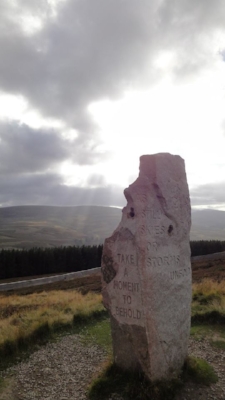Angela Meyer is an award-winning publisher, creator of intriguing literary fiction and non-fiction and one of my greatest inspirations.
Angela was the commissioning editor who spotted my first novel, Olmec Obituary, and saw it's potential, back when I didn't know what a 'commissioning editor' was. She guided my anxious steps along the path to published author, and encourages me still to strive for greater vision, depth and meaning in every piece I write.
Recently, I spoke to Angela about the release this month of her own first full-length work of fiction: A Superior Spectre. Evoking shadows of Wuthering Heights, George Orwell and Philip K. Dick, Angela's debut novel is as haunting as the title implies. So what was it like for a seasoned publisher to tread the trail of the first-time novelist?
1. In your role as a publisher you’ve contributed to the launch of many authors’ first novels. This time, though, you’re the debut novelist. Has the lead up to release been as expected, or have there been surprises?
I am an extremely privileged person to get to work with other authors and, yes, often be by their
side for the process of publishing their first novel. Now that it’s my turn, in many ways it is easy to
know what to expect, but it is also just completely different! When it’s your own words, your own
characters… the anxiety is high. But I also think that being in the industry has made me realise that sometimes we all take it a little too seriously. We are not solving world peace, here. I’ve been
through more ups and downs this year than I expected and so every little thing that happens around
the novel is just a pleasure. Mainly I've been looking forward to the launch because I haven’t seen friends and family very much this year at all. I just can’t wait to have a whisky and some hugs. And I just
hope it sells enough so I can keep writing and publishing. That’s all I need.
2. I thoroughly enjoyed A Superior Spectre, including the unusual mechanism you've employed to interweave disparate timestreams. What was the initial spark or catalyst for you to approach the story in this way?
There were a series of sparks for Spectre —a future world built out of a previous manuscript, a short
film I made when I was about 19 (in which I first explored neurotech), and several trips to Scotland.
It all coalesced in 2013 at the Edinburgh International Book Festival, and over the months spent
travelling and working in Scotland with my ex-partner. Some of the panels at that festival influenced
the book, as did the places we stayed.
I figured out where Leonora was from on the road from Tomintoul to Braemar, when the clouds parted and the sun shone down. I’m sure you know that feeling, when you decide to be open to influence, as a writer, and you are walking around in the world attuned to another layer or plane. It can make you seem quite mad to others, but luckily my ex, Gerard (still a very good friend) is a writer, too, and was completely understanding.
Dr Angela Meyer, author of A Superior Spectre.
3. What pulled you toward each of the two main characters’ settings, one in the past, one in the future?
My dad was always into science fiction so I grew up watching a lot of sci-fi films and TV shows and I
think there was some imprinting there. And I read Orwell’s 1984 at a formative age, too, and
admired the way a book like that reflected both the moment in which it was written, and has
remained relevant, politically, in many ways (but not all… I wrote about that here).
When I started writing fiction I wrote realism but when I moved toward more speculative writing, and also historical, and dark, and absurd, and my writing got better, and also started to feel more natural. Jeff’s near-future time frame came directly out of my previous (unpublished) manuscript, so there’s a whole world built behind Jeff that you don’t need fully explained or rendered here. And Leonora’s time frame—19 th Century Scotland, comes out of a love of Scotland, a fascination with the gothic, and something that probably exists within many of us in contemporary high-tech consumerist society—a longing for quiet, nature, slowness, space around you.
4. And you journeyed significant distances to investigate those places. Could you tell us what compelled you to travel, and what impact it had on the novel?
So that trip in 2013 was my third trip to Scotland. Gerard and I spent time working in a guesthouse in
the Speyside whisky region (very near where Leonora ended up being from), and then we worked on
a tiny island reached only by a footbridge in the west of Scotland, where I ended up placing Jeff in his
isolation. Then Jeff and Bethea move to Islay, where I went on my fourth trip to Scotland. On that fourth trip I also went to the Isle of Jura and stayed at Barnhill, the house where George Orwell
completed 1984. I have stayed in Edinburgh on every trip, too, and chose Aunt Ailie’s place from
simply walking around the streets of the new town until something ‘felt’ right. On the trip to Islay I
spent two nights completely alone and isolated, without electricity, as I wanted to experience 19 th
Century conditions, and also wanted to be able to describe Jeff’s isolation. Some have said it’s a very
sensual novel and I think that comes in part from me allowing myself the time away from my busy,
busy life to sink in to the world I was imagining – to touch and smell and taste it.
5. What were the aspects most joyous, and most challenging, of completing the full manuscript?
When I first came up with the idea, I thought: I’m not sure if I can pull this off. I knew I was trying to
do several things at once, thematically, pull off quite a complex plot, and also write one very
challenging (and unreliable) character. So one of the most joyous aspects was when I found a way to
make it all come together. Those moments when bits would click into place, and I’d be like: Oh!!
That’s how to do that! One of the most challenging aspects of completing the manuscript was
publication. Once you’ve put that much into a work, and actually you are rather in debt because of
the travel and the time you’ve taken to complete it, of course you would like it to be published. It
would be disingenuous to claim otherwise. It was very widely rejected, and kindly so (they saw it as a
risk), and that was rough. I’m so grateful to Ventura for seeing it as a worthy risk.
6. One of the main characters is, shall we say, someone most people would avoid. What drew you to write a character so self-centred, both damaged and damaging?
I don’t want to say too much about Jeff as I’ve been amused and fascinated by different people’s
reactions to him. He’s abhorrent but he’s also normal. Many people have secret selves and secret
desires, many people obsess and let things fester. Many people think they’re doing harm in one area
but are blind to the fact they’re having a destructive impact elsewhere (self-loathing is essentially
self-absorption). Some people act on ‘bad’ thoughts and others don’t (and ‘control’ versus letting go
is one thing that interests me very much). We mostly do not face the worst things about ourselves.
I’m interested that you think Jeff is someone most people would avoid. I don’t think that’s true. He’s
an intelligent, white, middle class man with a job and friends. No one would really think to avoid
him. And there was plenty of inspiration for him, a strange blend of men I have loved (from
childhood on) and raged at, but, also, there are undeniably parts of me in Jeff – in fact when I was
younger I was often drawn to ‘the tortured male’ in books and films because partly these were
characters I found that expressed some elements of my own (often hidden) despair, auto-isolation,
shame, and so on. Kafka is a good example. The rage, in part, came from the way it seemed easier or
more acceptable for them (and this is perhaps a cultural ‘entitlement’) to sink in to their darkness.
Anyway, I could go on all day about why I wanted to make sure Jeff was a complex (and not outright
villainous) character, but I will restrain myself (control v letting go, ay?).
The road to Braemar, where Angela met Leonora
7. A Superior Spectre lingers. Tendrils of it snaked through my thoughts for weeks after my first reading. As the author, have you felt haunted by either the characters or the storyworld yourself?
No. Writing it was a fulfilling and actually a psychologically cleansing experience. But I want to write
books and characters that linger, because that means it has some greater meaning beyond the page,
and perhaps the potential for psychological expansion in the reader. I’m very interested in
psychology, and art and psychology (the ‘effects’ of the work). My favourite books and films have
done this to me: really lingered and almost left a taste in my mouth. But I also find it amusing that I
want to do that – isn’t that a Jeff-like thing? To want to have some control over the reader’s mind
and senses? It makes me question, on the whole, whether authors are good people. We like to think
we are – that we are expanding hearts and mind – but perhaps we are just infections.
...
A Superior Spectre is itself infectious, and highly recommended.
Angela Meyer’s writing has been widely published, including in Best Australian Stories, Island, The Big Issue, The Australian, The Lifted Brow and Killings. She has previously published a book of flash fiction, Captives (Inkerman & Blunt). She has worked in bookstores, as a book reviewer, in a whisky bar, and for the past few years has published a range of Australian authors for Echo Publishing, including award-winners and an international number one bestseller. She grew up in Northern NSW and lives in Melbourne. A Superior Spectre is her debut novel.








